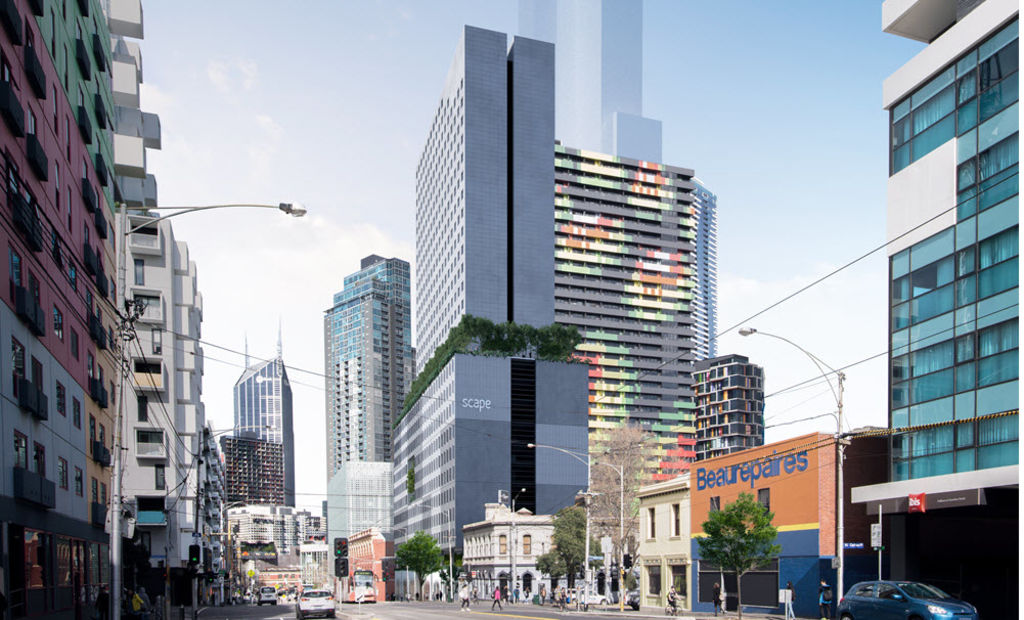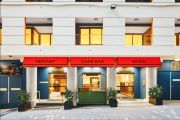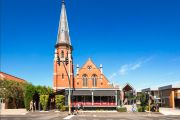
Scape will build world's tallest uni student tower in Melbourne's CBD
Accommodation provider Scape Student Living is planning the world’s tallest student digs, a 60-storey tower in the Melbourne CBD, overlooking RMIT University.
Significantly, the skyscraper will include a component of what Scape calls ‘city living units’. The apartments can lay claim to being one of the first efforts in Australia to create ‘build-to-rent’ investment.
The $300 million-plus project will, if approved, comprise 740 student beds, along with 146 city living units, according to plans submitted to the state government.
The proposal for the Franklin Street site includes a small component of retail space, along with more than 11,500 square metres of commercial space, which could incorporate some academic use as well.

The project at the old CUB site on Swanston Street will have 870 student beds.
A portion of that space will be set aside for a business-to-student incubator, similar to one Scape has set up at its Shoreditch facility in London, where co-working provider WeWork also has space.
“It is the largest development that we’ve undertaken globally and it will be, when it’s built, the tallest student accommodation in the world,” said Craig Carracher, who co-founded the Scape platform in Australia.
The project sits on a 2000-square-metre site at 97 Franklin Street which Scape bought late last year for $56 million. Its previous owner had plans approved for a 62-storey tower.
It is one of a series of student accommodation projects that Scape hopes to develop into a $1 billion portfolio in Melbourne’s inner-city university precinct.
A block away on Swanston Street, Scape has also submitted plans for a plot of land it acquired two years ago on the old CUB brewery site from Grocon. The 30-level tower will deliver as many as 870 student beds.
Also on Swanston Street, directly overlooking RMIT, Scape’s first student accommodation effort in Melbourne, a 780-bed tower, is under construction and rising fast.
And nearby, Scape is eyeing two more prospective sites in the precinct that it hopes to redevelop into more student digs.
For that, Scape has established a unique collaboration agreement with the state government which is acquiring the sites in the short-term for Melbourne Metro Rail project.
The student accommodation platform could also support Scape’s entry into the broader build-to-rent sector, an industry which is thriving in the US and Europe but is yet to establish itself in Australia.
“Melbourne really would be leading the way because it’s not happening anywhere else in Australia,” Mr Carracher said.
Scape is hoping the Franklin Street city living units will find a ready market in visiting academics, relatives of students and city professionals.
Residents in those units will be on separate floors to the students and will have access to business facilities in the tower.
Backed by global investors Bouwinvest, APG and China’s ICBCI International, Scape has projects in Sydney and Brisbane as well, establishing itself as one of the the bigger players in the fast-growing student accommodation sector.
Other players include Blue Sky Private Real Estate and its joint venture partner Goldman Sachs which have a pipeline of 3300 student beds.
Dubai-based student accommodation provider GSA which last year acquired a 7150-bed UK student accommodation portfolio in partnership with Singapore’s sovereign wealth fund GIC has also returned to the Australian market. It has two sites in Melbourne already.
Underpinning the rush of investment into the sector is a substantial shortfall in supply of beds for international students. In Melbourne the gap is more than 84,000 and in Sydney it is close to 43,000.










